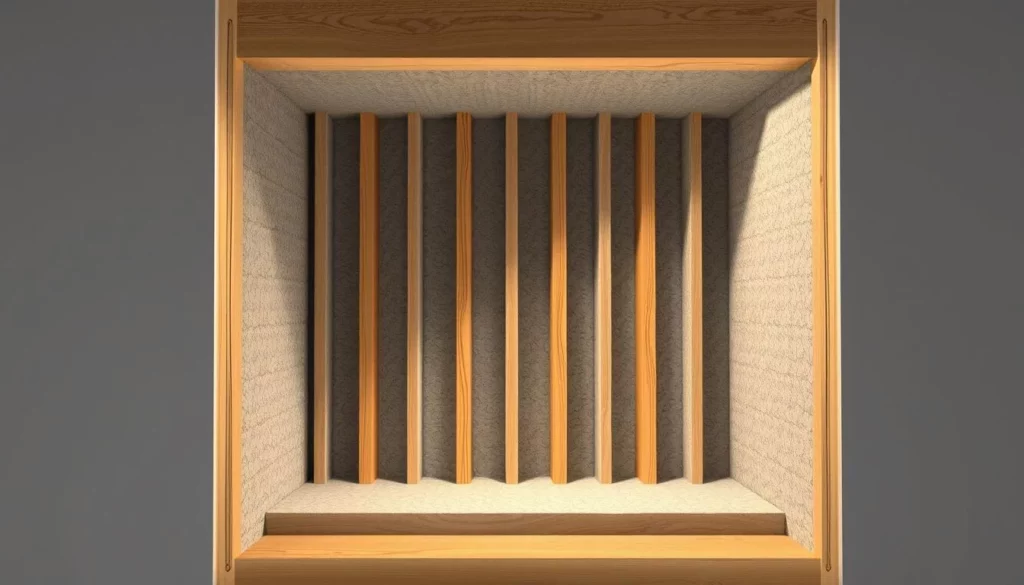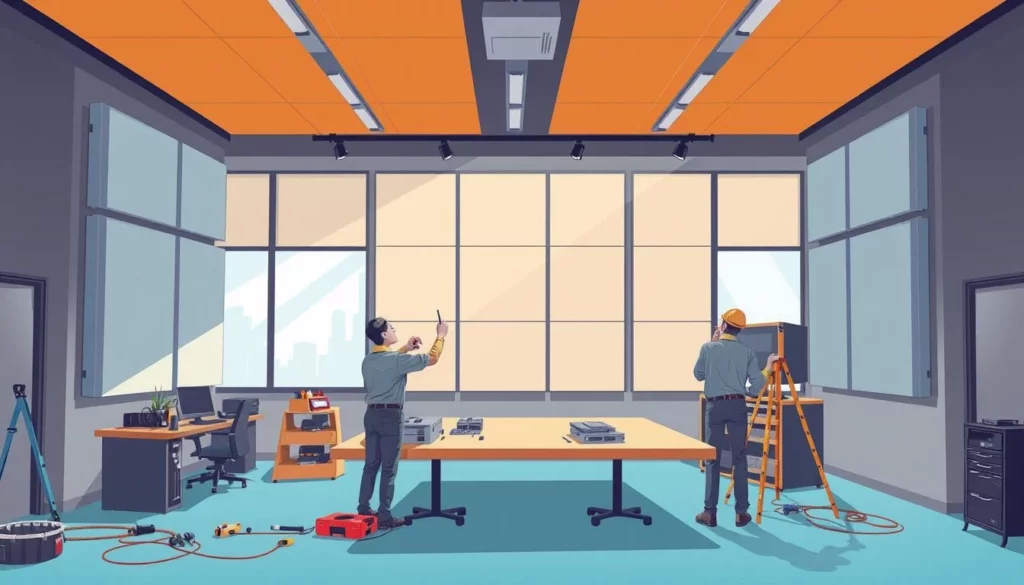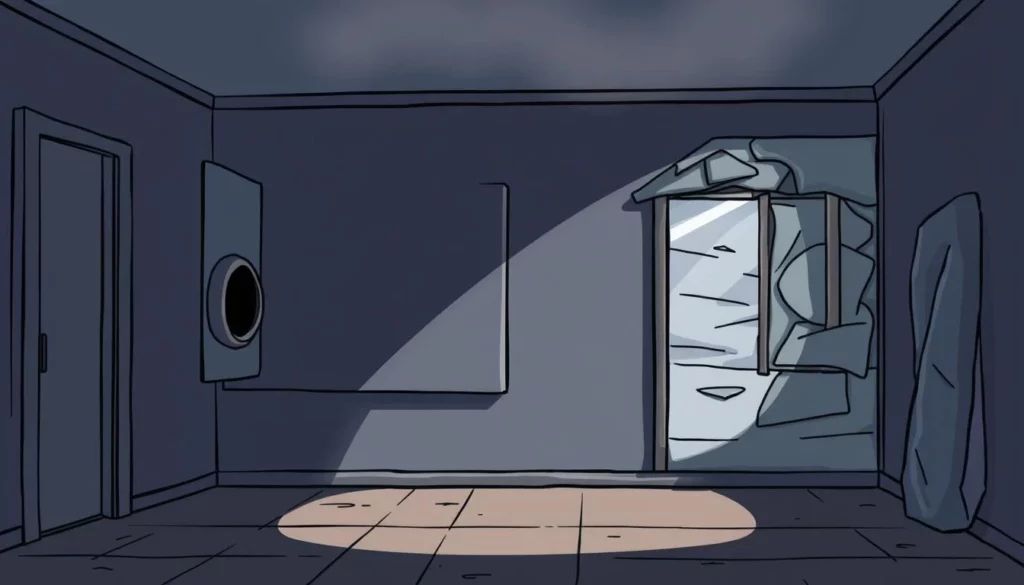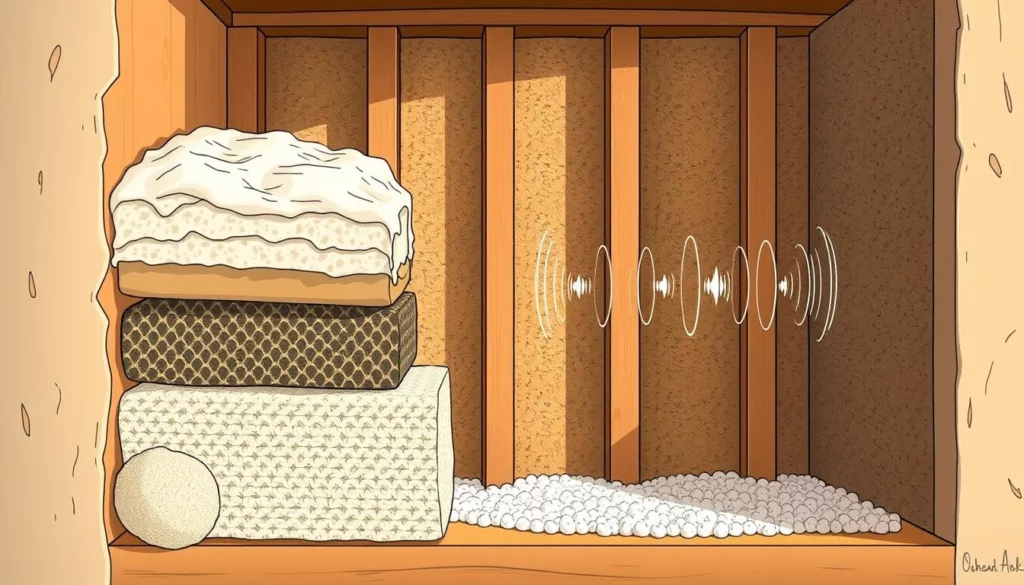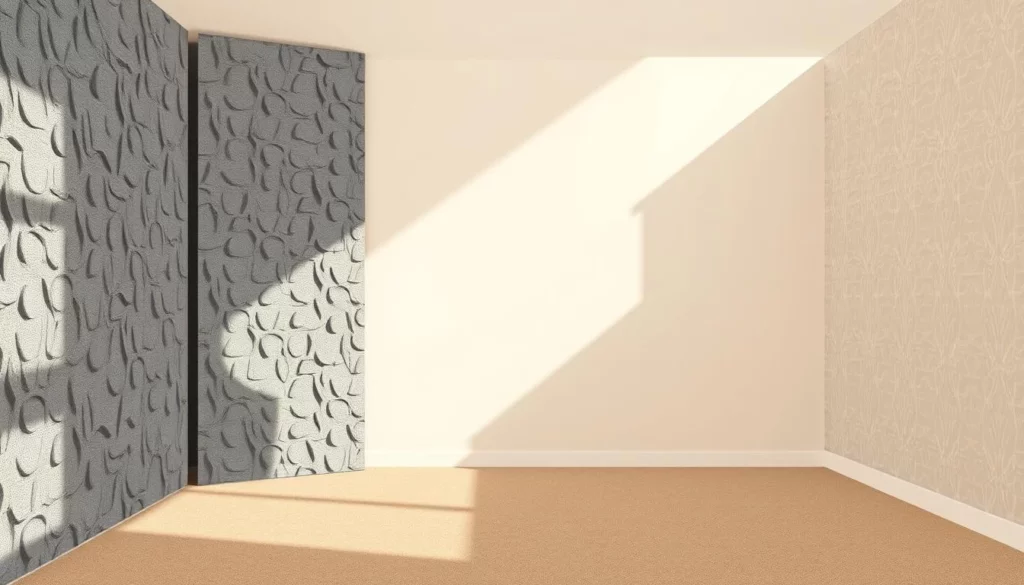Looking for a way to keep your space quiet? Double Wall Construction for Maximum Soundproofing is here to help. It’s perfect for blocking out city sounds or the noise from a busy road. This method makes sure your area stays calm.
This guide covers everything about double wall construction. It highlights the advantages, the science behind it, and how to apply it. Learn how this approach can make your space much quieter.
Understanding Double Wall Construction
Double wall construction is a great method for top-notch soundproofing. It uses special noise reduction techniques that make walls better at blocking sound. This method builds two separate walls with a space in between. This space helps block noise from passing through.
What is Double Wall Construction?
Double wall construction involves two separate walls with a gap between them. It uses sound isolation materials to keep sound from passing through. The space between the walls acts as a buffer. It absorbs sound vibrations, offering excellent acoustic insulation.
Benefits of Double Wall Construction
Double wall construction has many benefits, especially where sound control is key. The main advantages are:
- Enhanced privacy through better soundproofing.
- A big drop in outside and inside noise, due to effective noise blocking methods.
- Improved energy efficiency because of better insulation.
Key Components of Double Wall Systems
A double wall system has several important parts that ensure great soundproofing. These include:
- Framing and Wall Assembly: Made from materials like wood or metal studs, built separately and spaced apart.
- Sound Isolation Materials: Special materials that help dampen sound, including soundproofing drywall and insulation.
- Air Gap: The space between walls that helps block sound, playing a big part in noise reduction.
Below is a comparison table that shows the differences between double wall and traditional wall construction in soundproofing and materials used.
| Attribute | Double Wall Construction | Traditional Wall Construction |
|---|---|---|
| Soundproofing Effectiveness | High, due to combined use of air gap and acoustic insulation | Moderate, relies on basic materials |
| Materials Used | Sound isolation materials, acoustic insulation, dual framing | Standard drywall, single framing |
| Noise Reduction Techniques | Advanced, implements multiple soundproofing layers | Basic, limited to single wall thickness |
How Double Wall Construction Reduces Noise
The Double Wall Soundproofing System is key in lowering noise in many buildings. It uses top-notch Soundproofing Renovation Techniques. This helps improve a building’s quietness, making it perfect for homes and businesses.
Sound Transmission Class (STC) Ratings
STC ratings measure how well a wall blocks sound. The higher the STC rating, the better it is at isolating noise. The Double Wall System is especially good at this. It beats single wall constructions at limiting sound from the air and impacts.
The Science Behind Soundproofing
Soundproofing uses mass, damping, and decoupling to work. In Double Wall Systems, there’s a space between walls acting like a sound sponge. Plus, it has several layers of drywall and insulation. This combination cuts down on noise well, giving you a quieter space.
By using these Soundproofing Renovation Techniques effectively, Double Wall Construction becomes a crucial part of modern design. It helps greatly reduce noise.
Comparing Double Wall to Traditional Walls
Looking into Soundproofing Solutions? It’s key to weigh double wall construction against single wall systems. Each method has its own perks and downsides, influencing your choice greatly.
Pros of Double Wall Construction
Double wall construction shines in Noise Control Technologies. It offers top-notch soundproofing, thanks to its design. There are two walls with a space in between acting as an insulation, which cuts down noise and makes your home quieter.
Adding sound isolation materials like acoustic insulation and resilient channels boosts this system’s effectiveness. The extra layers and space stop sound waves, leading to a higher Sound Transmission Class (STC) rating. This means a more peaceful living area.
Cons of Double Wall Construction
Double wall construction has great Soundproofing Solutions but has its downsides too. The extra materials and work needed make it costlier. It also takes up more room, which could be an issue in smaller places.
Setting it up can be complex, often needing experts, which adds to the cost. Yet, for those after top-notch noise control and sound isolation, this investment might be worth it.
Ideal Applications for Double Wall Construction
Double wall construction is a smart choice for excellent soundproofing and acoustic insulation. It works great for making quiet spaces in many places. Here are some top uses where double wall construction really helps.
Residential Use
At home, double wall construction makes for quiet, private areas. It stops noise from moving between rooms. This means activities in one room won’t bug people in another. It’s great for bedrooms, nurseries, or offices, making your house more comfortable.
Commercial Use
For commercial buildings, good sound insulation is key for a calm, productive space. Double wall construction is ideal for offices, meeting rooms, and health centers. These places need quiet for focus and privacy. Using this building method helps achieve a peaceful work environment.
Studios and Home Theaters
For making music or watching movies, double wall construction is top-notch for soundproofing. It keeps outside noise away and inside sounds in. This is perfect for studios, home cinemas, and practice rooms, giving the best setting for clear audio.
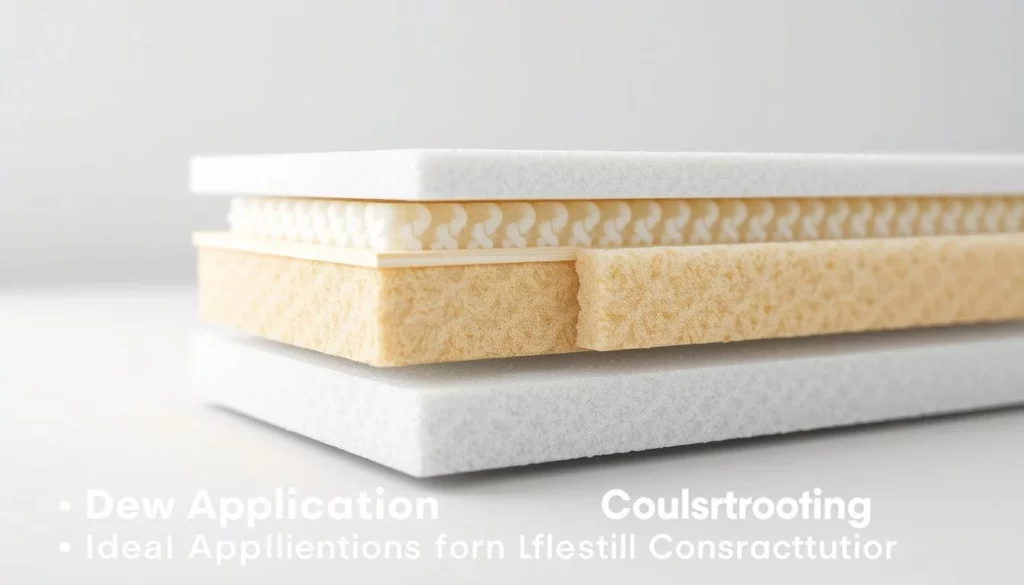
| Application | Benefits |
|---|---|
| Residential | Improves privacy and reduces noise transfer between living spaces. |
| Commercial | Enhances productivity and confidentiality in workspaces. |
| Studios and Home Theaters | Ensures high-quality sound isolation and acoustics. |
Factors to Consider Before Installation
Before you start with Double Wall Construction for Maximum Soundproofing, look at key factors. This ensures you get the best performance and save money. Think about the cost, how much space you have, and what materials to use. This will help you find the right solution for your needs.
Cost Considerations
First off, think about how much it will cost. Double Wall Construction offers great noise reduction but costs more than standard walls. Look at your budget and decide if the improved soundproofing is worth it. Don’t forget, this can also save you money on energy and raise your property’s value.
Space Requirements
Space is crucial too. These walls are thicker, so you’ll need more room. Make sure you have enough space. This might mean you have to change your room’s layout. Keeping these space needs in mind is key for effective soundproofing.
Material Choices
The materials you pick will affect both the project’s cost and how well it works. There are many types of insulation, framing, and soundproof layers to choose from. Your material choice impacts the sound reduction quality and the wall’s lifespan. Do your homework to choose the best materials for your soundproofing method.
| Factors | Considerations |
|---|---|
| Cost | Higher initial investment but potential long-term savings |
| Space | Requires adequate room to accommodate thicker structure |
| Materials | Variety of options impacting cost and noise reduction efficacy |
Installation Process of Double Wall Construction
Starting the setup of a Double Wall Soundproofing System needs a clear understanding of the steps. It’s important to follow the right steps for effective noise control and to use resources wisely. Knowing what to watch out for helps you get the best results.
Step-by-Step Installation Guide
First, attach fabric to the back side of the inside wall. This is key for strength and sound blocking. Then, fill the outer wall and space between with dense-packed cellulose insulation. Make sure the air barrier is well protected to make your Soundproofing Renovation Techniques work well.
Planning for obstacles like plumbing is crucial. It makes putting in fabric or netting easier, which helps with sealing. Using specific insulation levels, like 3.5 lb/ft3, and achieving tightness is necessary.
It’s a good idea to use Intello as the main air barrier. Use spacer blocks to keep things straight, especially at tricky spots. Making sure drywall goes over insulation smoothly finishes the setup.
Common Mistakes to Avoid
Mistakes during setup can lessen how well the Double Wall Soundproofing System works. Not sealing air barriers well at openings can make noise control worse. Not paying attention to insulation density can also affect performance. Avoid these errors to make sure your soundproofing works.
By sticking to these suggestions and using the latest Noise Control Technologies, you can make your space quieter. Always look for good advice and follow the guide for a successful install.
Acoustic Treatments to Enhance Soundproofing
It’s not just about picking the right materials to soundproof; it’s also key to use effective acoustic treatments. Such strategies make your Double Wall Sound Barrier way more efficient. They ensure the noise gets reduced to the max.
Use of Soundproofing Insulation
Putting Acoustic Insulation between your double walls is a top way to cut down on sound. Made from minerals, this stuff stops airborne noises in their tracks. You’ll find it in forms like fiberglass and rock wool, known for their great sound-blocking.
Adding Resilient Channels
Resilient channels are slim metal strips put between the drywall and studs to lessen sound moving through. This technique keeps the wall’s layers apart, cutting down vibrations and bettering the Double Wall Sound Barrier. Adding these channels into your structure makes your soundproofing efforts way better.
Incorporating Mass Loaded Vinyl (MLV)
Mass Loaded Vinyl (MLV) is a heavy, but flexible sheet that can go on walls, floors, or ceilings to up your soundproofing game. It’s super effective because it’s both heavy and versatile. When you mix it with Acoustic Insulation and resilient channels, you get a solid soundproof setup.
| Treatment | Description | Effectiveness |
|---|---|---|
| Acoustic Insulation | Material used to dampen sound within walls | High |
| Resilient Channels | Metal channels that reduce sound transfer | Medium to High |
| Mass Loaded Vinyl (MLV) | Flexible membrane added to enhance sound barrier | Very High |
Maintenance of Double Wall Systems
To keep your double wall construction working well for soundproofing, good upkeep is key. Checking it often and fixing issues promptly makes sure it stays effective and lasts longer.
Regular Inspection Tips
Looking over your double wall systems regularly helps spot problems early. Here’s how to do it right:
- Look for any cracks or gaps that could hurt the sound barrier.
- Make sure the seals around doors and windows are still good.
- Check the wall surfaces for moisture damage since this can weaken structure and reduce sound blocking.
- See if the flexible putty pads around junction boxes are still flexible, not hard.
Signs You Need Repairs
It’s vital to know when to call in experts for your double wall system. Watch for these signs:
- If it’s getting noisier despite the soundproof materials, there might be a leak in the barrier.
- Any visible wall damage like dents, holes, or water stains can lower soundproofing power.
- Walls that are loose or coming apart can affect the acoustic qualities.
- Structural changes or settling might damage the double wall setup.
Keeping your double wall systems in good shape ensures the best soundproofing. It also makes them last longer, keeping your space peaceful and cozy.
How to Optimize Your Existing Walls for Soundproofing
Want to make your home or office quieter? Let’s dive into some easy yet effective soundproofing tips. These steps will help cut down on noise.
Adding Additional Layers
One easy fix is adding more drywall layers. This is a top tip for less noise. Make sure the layers are well-sealed. It stops sound from getting through. To do even better, put a sound-stopping compound between the layers. This method helps make your place much quieter.
Filling Air Gaps
Air gaps can let a lot of noise in. Filling these gaps makes a big difference in how quiet your room is. Use special foam or caulk to seal these spots. Doing this not only makes your room quieter but also nicer to be in.
Sealing Cracks and Openings
Don’t let cracks and open spots ruin your soundproofing work. Seal them up with a good acoustic sealant. This step is key to keeping your place silent. It ensures no sound sneaks through those small openings.
Comparing DIY vs. Professional Installation
Choosing between DIY soundproofing and hiring pros can be hard. It’s key to know the pros and cons of each. This helps you make a smart choice.
Pros and Cons of DIY
DIY soundproofing is great if you like doing things yourself and know a bit about home upgrades. It saves money because you don’t pay for labor. You can spend more on materials, like a double wall for soundproofing. Plus, you decide when to work on it.
But, DIY might not always work out. It takes a lot of time, and mistakes can mess up the soundproofing. If you’re not sure how to soundproof well, you might not get the results you want.
When to Hire a Professional
Hiring a pro means you get their skills and knowledge. They can suggest the best soundproofing, even a double wall, that fits your needs. They’re also better at handling tricky installs that DIY folks might not manage.
Though more costly at first, hiring a pro saves time and stress. It’s especially smart for big projects or special soundproofing jobs. If you need the best sound quality, like in studios or home cinemas, go with a pro.
To find out more about DIY vs. pro soundproofing, check out this guide. Making a well-informed decision helps your project succeed.
Conclusion: Is Double Wall Construction Right for You?
Are you thinking about double wall construction for soundproofing? You need to think about a few things first. It’s especially good for homes, offices, and places like studios and home theaters.
Evaluating Your Soundproofing Needs
First, figure out how much noise you need to block. Double wall construction is great if you’re near a lot of noise or need quiet spaces. Look at different ways to soundproof and compare them to your situation. Think about your building’s structure, your budget, and how you want it to look.
Final Thoughts on Double Wall Systems
Double wall systems are a smart choice for better noise control and privacy. You need to understand what they involve and how they can help. They’re good for many places, from homes to offices to special rooms. Think carefully and pick the soundproofing that meets your needs best.
